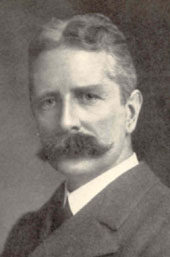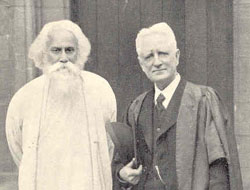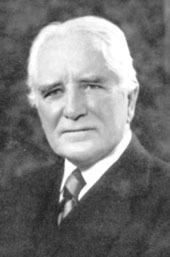
Lawrence Pearsall Jacks (October 9, 1860-February 17, 1955), or L. P. Jacks, as he was always known, was probably the most widely known British Unitarian minister in both Britain and North America between 1914 and 1940. He was an educator, a prolific writer, and an interpreter of modern philosophy. According to L. A. Garrard, he was ‘the last of the Victorian prophets in the line of Thomas Carlyle’. Jacks argued for a natural religion for the common man using twentieth century means of communication.
Lawrence was born in Nottingham on 9 October 1860 of non-Unitarian parents, Anne Steere and Jabez Jacks. After the early death of his father in 1874, George Herbert, the headmaster at University School, Nottingham, continued his education without fee. Herbert, a low chuch evangelical, competed with the local Anglican curate and the Jacks’s lodger, Unitarian Sam Collinson, for Lawrence’s religious allegiance. Collinson lent him Matthew Arnold’s Literature and Dogma, 1873, from which Lawrence learned of a common ‘Power-not-ourselves’ that inspired and shaped all righteous activity. ‘This thought,’ he later reflected, ‘repeating itself in whatever church or chapel I attended gave me the feeling that, fundamentally, religion was the same in all of them.’
Not wanting to be a burden on his mother, Lawrence left school at seventeen and for five years taught in a number of private schools, most of which he found intolerable. At the same time he earned a degree as an External Student at the University of London.
Much interested in oratory and sermon-tasting Jacks had been attracted by Richard Armstrong, the Unitarian minister at Nottingham, and Stopford Brooke, who had left the Anglican church to found his own chapel in London. When he entered Manchester New College, London in 1882 to train for the ministry, Jacks was uncertain whether he was a Anglican or a Nonconformist. Here, under the influence of James Estlin Carpenter and James Martineau, he became Unitarian. ‘I had been virtually a Unitarian (as I still am) but without knowing it’, he later wrote. ‘The experience of being among Unitarians who did know what they were, and attached much importance to it, was entirely novel to me, but I soon fell into their ways and found it easy to go forward on their road, the more so because the other roads became closed to me.’
Nevertheless all his life Jacks did not sit easily in a denomination, and often fought what he called ‘denominationalism’. Among Unitarians he found many fellow spirits, Martineau and Armstrong for instance, ‘who disliked denominationalism as much as I did; but on the whole I was disappointed in not finding more of them.’
On graduating in 1886 Jacks went on a scholarship to Harvard for a year where he came under the influence of philosopher Josiah Royce, from whom he learned of the ‘Beloved Community’, those ‘countless millions who, from the first, have carried the burden of humanity, fallen asleep in their generations and left their memorial with God.’ He also studied Dante under Charles Eliot Norton, learning the difference between the material universe, in which any individual is insignificant, and the spiritual universe in which people are ‘enthroned as gods at the living centre’.
At the end of his American stay, Jacks remained uncertain about his ministerial calling; ‘I began to see that this hearsay, second-hand stuff about God and Christ, in which I was so prolific, was not religion, but at best only a reminiscence or ghost of religion’. Nonetheless in 1887 Jacks was invited, on Carpenter’s recommendation, to become assistant minister to Stopford Brooke at his London chapel. ‘Had I received an invitation to become demigod to Apollo my surprise would hardly have been greater’, he recalled. An added attraction was Brooke’s fourth daughter Olive, with whom Jacks fell in love on the ship back to England. They married in 1889 and had five sons and a daughter.
In 1888 Jacks was appointed Unitarian minister at Renshaw Street Chapel Liverpool, moving in 1894 to the Church of the Messiah Birmingham, both leading pulpits exceptionally held by such a young man. At Renshaw Street he succeeded John Hamilton Thom and Charles Beard. From Beard, Jacks took the idea that his proper work was ‘completing the work of the Reformation’, though not Beard’s brand of assertive Unitarianism. The Church of the Messiah, once the church of Joseph Priestley, was in the 1890s associated in the public mind with Joseph Chamberlain, who was amongst the leading politicians of his time. Chamberlain and Jacks got on well though their political views were very different. In Birmingham Jacks developed his belief ‘that the Common Man is the appointed saviour of the world’. By Common Man he meant not so much a class designation—though he identified with and loved labourers and peasants—but what all people held in common. His goal was to create a natural religion for the common man, that is to say, everyone.

In 1903 Jacks was appointed a Professor at Manchester College, which had moved to Oxford from London. He studied and taught Spinoza and Henri Bergson, offering ‘readings between the lines’ and publishing The Alchemy of Thought, 1910. Bergson’s philosophy did not attract Unitarians at this time. When a student from Chicago, Illinois came to Oxford to study the philosophy of L. P. Jacks, he was told by tutors, ‘We did not know that L. P. Jacks had any philosophy.’ Jacks was Principal at Manchester College, succeeding Carpenter, from 1915 until he retired in 1931. He never felt he was successful in his Principalship because staff and Unitarians on the College Council did not follow wherever he might lead. He had hoped to relieve the ‘insufficient ventilation’ of the theological school by introducing lay students and exposing the ministers-in-training to eastern religion and to the many non-theological influences in the world around them. In his autobiography, Confessions of an Octogenarian, 1942, he sums up this period with ‘I overshot the mark’.
Jacks’s significant contribution to theology and philosophy was as editor of the Hibbert Journal, which he served from its foundation in 1902 until 1948. By 1910 it had become the leading journal for the free exchange of ideas on religion and philosophy in Britain. A special issue in 1909, Jesus or Christ?, created worldwide interest. The Hibbert Journal provided a successful medium for the exposition of early twentieth century continental philosophy, which reflected Jacks’s interest. It introduced the work of French philosopher Alfred Loisy to British and American readers, stimulated debate amongst leading scholars on the relationship between religion and science, and discussed comparative religion.
Jacks was an individualist who aimed to speak to the intelligent person. He first came to national prominence during the First World War when he argued from a non-pacifist moral viewpoint that German militarism must be defeated. He proclaimed after World War I that modern life had become increasingly mechanical, that the military spiral had become more deadly that the economic one. He saw mankind going along a dangerous path, a view encapsulated in his Revolt Against Mechanism, 1933. ‘The mechanical mind has a passion for control—of everything except itself. Beyond the control it has won over the forces of nature it would now win control over the forces of society of stating the problem and producing the solution, with social machinery to correspond.’

In The Education of the Whole Man, 1931, Jacks proposed education as the hope for the future. He contended, in a 1938 BBC Radio National Lecture (forerunner of the Reith Lecture), that mankind must save itself from the mechanistic world, using education and world vision as the means. ‘Our intellectual development in the field of science has outstripped our human development in the field of character.’
Jacks was an active, influential, and popular lecturer in the 1920s and 1930s in both Britain and America. His books and addresses were popular rather than philosophically profound. He attempted to make the moral ideas based on philosophy and religion understandable to the intelligent layperson. In his 1922 Hibbert Lectures, Religious Perplexities, he argued that a spiritual way of life was essentially rational: “Faith is nothing else than reason grown courageous—reason raised to its highest power, expanded to its widest vision.” Christianity, he wrote, is ‘a smothered religion’. Yet ‘hidden within it as an inextinguishable spark of life, Christianity has an unauthorized version’ beyond creeds, institutions and analysis.
Although Jacks continued to claim to be a Unitarian all his life, by the 1930s he had left belief in institutional religion behind him. Critical of church structures and any form of denominationalism, on the creation of the General Assembly of Unitarian & Free Christian Churches in 1928 Jacks refused to let his name be added to list of Unitarian ministers. From 1914 and 1950 his views were constantly to be found in Unitarian journals and elsewhere, always well written and invariably controversial. He maintained a lifelong interest in psychical research. Despite being long viewed by many Unitarians as a wilful irritant, for the last twenty years of his life he was held in very high regard within British Unitarianism.
After Jacks preached in Liverpool Cathedral in 1933 the cathedral authorities were rebuked by a Convocation of the Church of England for allowing a Unitarian to preach in the Cathedral. This controversy in the press made him a nationally known popular figure.
Jacks’s published output over a period of fifty years was very large and consisted of visionary works, biographies, articles and addresses. He also wrote books of semi-philosophical parables—Mad Shepherds, 1909, and Legends of Smokeover, 1921—often set in a rural background, which had a wide appeal far beyond church audiences and went into numerous editions. He was recognised by the award of honorary degrees from the Universities of Liverpool and Glasgow in Britain and from McGill, Rochester, and Harvard in North America.
Death
Olive Jacks died in 1945. Some of their children had distinguished careers: Graham Vernon was director of the Commonwealth Bureau of Soils, 1946-1966; Hector Beaumont was headmaster of the leading private school Bedales, 1946-1962; and Maurice Leonard was director of the department of education, Oxford University, 1938-1957. Jacks died in Oxford on 17 February 1955.
Sources
Harris Manchester College, Oxford has a small number of Jacks’s letters, and a larger set of letters written to him. There is a letter by Jacks on his resignation from the Hibbert Journal at Dr. Williams’s Library. Among the many books written by Jacks are From Authority to Freedom: the Spiritual Pilgrimage of Charles Hargrove, 1920; A Living Universe, 1924; The Lost Radiance of the Christian Religion, Essex Hall Lecture, 1924; Realities and Shams, 1924; The Challenge of Life, 1925; Constructive Citizenship, 1928; The Inner Sentinel, a Study of Ourselves and Something More, 1930; Elemental Religion, 1933 Lyman Beecher Lectures, 1934; Co-operation or Coercion?, 1938; and The Idea of a World Community, 1949. His memoirs are Confessions of an Octogenarian, 1942 and Near the Brink, Confessions of a Nonagenarian, 1952. There is an entry in the Dictionary of National Biography by Lance A. Garrard. Obituaries include those in The Times (18 February 1955), The Inquirer (26 February 1955), and the Hibbert Journal (April 1955). See also Rennie Smith, ‘L.P.Jacks: Thoughts at 80 and 90’ in the Hibbert Journal (October 1960) and in The Listener (16 February 1938). Alan Ruston has written an entry on Jacks for the Dictionary of 20th Century British Philosophers (2004).
Article by Alan Ruston
Posted July 23, 2003